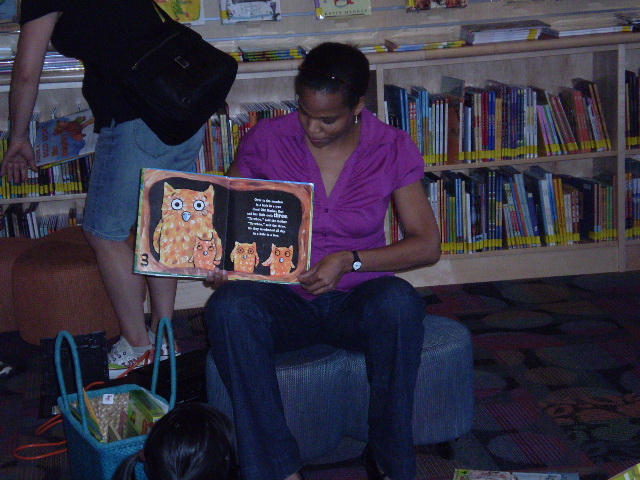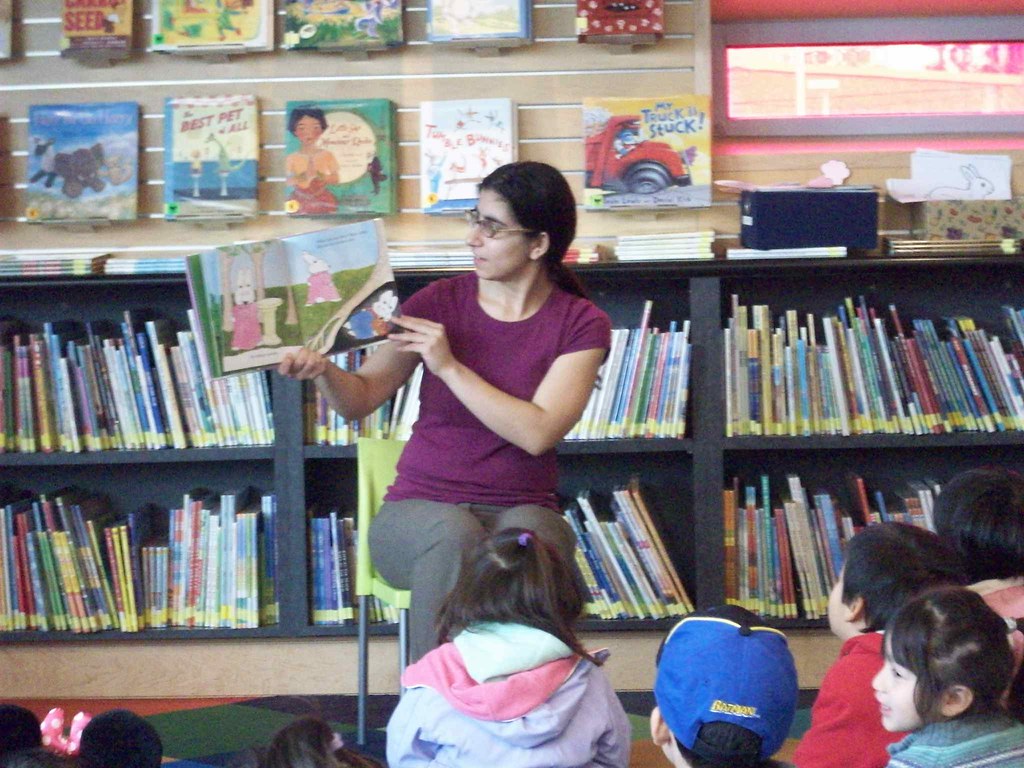 |
| CC by San Jose Library (Flickr) The Read Aloud program I volunteer with is not affiliated with SJPL. These photos are for illustration only. |
 |
| CC by San Jose Library (Flickr) |
Possible titles for Read Aloud program
Before buying new books, I evaluate their appropriateness for the program. What am I looking for?
Content
Readability
In addition to this evaluation before purchasing -- which weeds out a great number of interesting-looking titles (which can be used in other ways!) -- I request feedback from the volunteer readers about what they enjoyed or found challenging, and how the discussion went. Usually this is positive, but critical feedback (notably, about the students' interest level and (un)familiarity with a subject) can be very helpful. Sometimes, despite the work I put in, the book is just a dud. In that case, I try especially hard to make the next month's assignment extra-exciting for that class.
Before buying new books, I evaluate their appropriateness for the program. What am I looking for?
Content
- What topics does the book address?
- Are they in line with the mission and values of the program and the school culture?
- Does the book support diversity through its text, illustrations, language, and publication?
- Are there any areas of concern? Potentially sensitive or objectionable content? These may need to be screened with the teacher/volunteer reader beforehand, or given extra support in discussion.
Readability
- How long is the story? If it's too long for one reading session, is there an appropriate place to stop and ask, "What do you think happens next?"
- Are the words and sentence structure simple or complex? What age, grade, or reading level will it fit?
- Is it INTERESTING to listen to? Some perfectly nice books just don't sound that great when read aloud. I look for "fun" language: rhymes, repetition, onomatopoeia that will appeal to children. Also popular, even among the older grades, is dialogue where the reader can "do the voices".
- Will students be able to read the book on their own?
- Is the type large enough to read while holding the book out to the class?
- Are the illustrations engaging, relevant to the text, and large enough to be seen from the back of the room?
- Is there bilingual text? Some readers will be more comfortable reading in more than one language.
Discussion
- Does the book simply tell a story, or is there room for classroom discussion afterward?
- What discussion topics will support reading comprehension and critical thinking?
- What new information can be introduced?
- Will the teacher or volunteer reader need any additional resource material to engage with the subject?
- Has this book been used before in Read Aloud? (I check the LibraryThing records.) If so, and it's still a good choice, it will need to be assigned to a different classroom or grade level.
- Is the book newly released or difficult to find, or is it likely that the students are already familiar with it?
- Would a title be especially appropriate for a seasonal celebration or curriculum? The program is held on the third Thursday of the month, which usually means that students have already been acquainted with the new topic by the time we have Read Aloud.
- What does this book add to the overall classroom collection? How does it differ from other, similar books I've used before?
- Almost all books donated through this program are hardcover picturebooks. If a title is important enough or extremely well-suited to discussion, and it is only available in softcover (like many independent social justice publications for children), an exception can be made. Occasionally chapter books are also donated, but as supplementary material in addition to a book for the Read Aloud session.
 |
| CC by San Jose Library (Flickr) |
In addition to this evaluation before purchasing -- which weeds out a great number of interesting-looking titles (which can be used in other ways!) -- I request feedback from the volunteer readers about what they enjoyed or found challenging, and how the discussion went. Usually this is positive, but critical feedback (notably, about the students' interest level and (un)familiarity with a subject) can be very helpful. Sometimes, despite the work I put in, the book is just a dud. In that case, I try especially hard to make the next month's assignment extra-exciting for that class.
 |
| CC by San Jose Library (Flickr) |
No comments:
Post a Comment
Please be civil to other commenters.